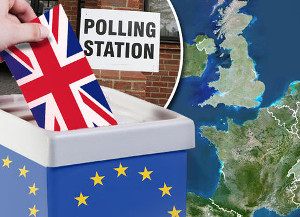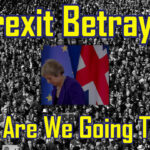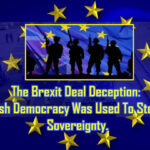I hate using the term Brexit. It has been spun to mean some sort of right wing rejection of humanity. The fact that 148 out of 232 Labour held constituencies voted to leave doesn’t matter. Labour Leave (Lexit) was deliberately side-lined from the outset. How else could the media maintain its right vs left narrative in relation to the UK leaving the EU? However, Brexit has become the commonly accepted term, so reluctantly I use it here.
Last night (29/01/2019) the UK Parliament voted on a series of amendments for the passage of the Theresa May’s Brexit deal through the house. All it revealed was that the UK Parliament isn’t functioning. The amendments served only to reaffirm what we already knew. Only two of the seven amendments passed. This included a non-binding agreement to stop a so called ‘No Deal’ Brexit and an agreed amendment to change the name of the ‘Northern Ireland backstop’ to “alternative arrangements to avoid a hard border.” A total waste of time really.
 The 2016 UK referendum on Britain’s EU membership gave the people two clear options. Leave or remain in the EU. It was firmly stated that the vote was a once in a lifetime choice and that Parliament would deliver the outcome. Politicians on both sides of the debate were explicit. Leaving would mean abandoning the EU single market and the European Customs Union. It would also mean an end to freedom of movement for EU citizens to the UK, and for British citizens to the EU.
The 2016 UK referendum on Britain’s EU membership gave the people two clear options. Leave or remain in the EU. It was firmly stated that the vote was a once in a lifetime choice and that Parliament would deliver the outcome. Politicians on both sides of the debate were explicit. Leaving would mean abandoning the EU single market and the European Customs Union. It would also mean an end to freedom of movement for EU citizens to the UK, and for British citizens to the EU.
Everyone knew what they were voting for. Subsequent claims by remain campaigners, that they didn’t, are baseless.
[sociallocker id=”2278″] [/sociallocker]
Despite dire warnings of the economic impact of leaving the EU, a majority of British voters were more concerned about other issues. Immigration, sovereignty, the lack of EU democratic oversight, taxation without representation, EU corporate rule, EU federalisation and EU military unification etc.
Upon reflection, the British people decided to leave the EU. No one asked the people what kind of leave deal they wanted, or even if they wanted one at all.
The UK government were then tasked with negotiating the withdrawal agreement and had 30 months to broker one. On the 29th March 2017, the UK government triggered Article 50 of the Lisbon Treaty, committing the UK to leaving the EU on 29th March 2019, with or without a deal. This remains the current position. Unless the UK and EU can come to an agreement, the UK, in accordance with the Lisbon Treaty, will leave the EU without a deal. Subsequently relying upon World Trade Organisation (WTO) arrangements to trade with EU member states.
Those who wish Britain to remain in the EU, such as the American global investment bank Goldman Sachs (who funded the UK’s remain campaign,) have incessantly highlighted the claimed economic folly of leaving. The British mainstream media, also with close links to multinational corporations, have heavily promoted remaining in the EU. Many leading economists, often themselves reliant upon the patronage of ‘big business,’ have highlighted the economic ‘disaster’ for the UK if it ‘crashes out.’ Despite the emotive language, very few have been particularly interested in discussing the huge impact upon the EU if it fails to agree a deal with the UK.

For example, in March 2018 the “European Committee of the Regions” published an economic impact assessment that predicted marked reductions in regional and national GDP, across the Eurozone. No mention of this was made in the UK MSM, as they busily ranted about Brexit’s impact upon the UK, while completely ignoring the effect on the EU. Thus perpetuating the myth that only the UK has anything to lose by leaving the EU.
While there will undoubtedly be a short term economic impact, if the UK leaves without a deal, no one actually knows what the long term effect may be, either for the UK or the EU. Accurate long term economic forecasts, on either side of the debate, are as rare as rocking horse shit.
However the economic disaster porn, spewed out in our 24 hour ‘news cycle,’ has little sway with most leave voters. They predominantly live in economically deprived regions, are accustomed to financial hardship and ‘making do,’ and don’t particularly care about an economic downturn. With low wages, non-existent job security, crumbling infrastructure and dwindling, overstretched public services, EU membership hasn’t done them any favours at all.
Unrepresented by the media, unless it’s to call them racists or ‘benefit cheats,’ their voice is seldom heard. Increasingly disenfranchised, as voting never delivers any constructive change, the EU referendum offered a last ditch chance for them to exercise the weakening democratic voice they have left.
Westminster is a distant, faceless bureaucracy, but at least leave voters can elect a representative who could potentially represent their interests. They almost certainly won’t, but the chance exists. With Members of the European Parliament (MEP’s) unable to propose any legislation, and power concentrated in the hands of the unelected, corporate spokespersons in the EU Commission, Brussels may as well be on Mars.
Leaving the EU will impact upon underemployed and poorly paid leave voters the most, but government decisions always do. It’s nothing new. Generally accustomed to hardship, they are far more resilient than the chattering, progressive liberatti who typically voted remain. Therefore they are more willing to bite the bullet if it mean sticking two fingers up to the globalists who have been ravaging their communities for decades.

Unfortunately, for impoverished leave voters, there was never any political will for the UK to leave the EU, nor any intention to deliver the referendum result if it went the ‘wrong’ way. From the day of the result, the obvious plan has been to ensure the UK will not leave the EU. The fix was in.
This is nothing new either. Since 1972 there have been 48 EU membership referendums. The only ones that have been re-run, or weren’t enacted, were five of the six which went against the EU. Only Greenland managed to leave the EU in 1982. There is no reason to believe any European nation state can successfully vote to leave the European Union. It is verboten.
The problem leave voters face is that the globalist banking corporations, who own the EU and all major political parties, most politicians, the mainstream media and, most importantly, the global debt, need the EU to create their system of global governance. It is an intrinsic part of their well-established plan and they aren’t about to let the plebs ruin it.
This can be clearly seen when we look at the funding of the official remain campaign ‘Britain Stronger In Europe’ and, latterly, the financiers of the allegedly grassroots ‘People’s Vote’ movement, calling for a second, or rather third, referendum.
The corporate MSM and the remain camp endeavoured to ‘prove’ the referendum was invalid. They alleged financial irregularities with Vote Leave’s campaign’s spending. Claiming this rendered the result unenforceable. In fact, under UK law, overspending in a referendum campaign can only result in a fine, and doesn’t in any way invalidate the result. But this isn’t the first time remainers have got things terribly wrong.
Perhaps even more galling, is that the remain campaign spent far more than leave. While Vote Leave made donations amounting to just over £600K to various ‘leave’ groups (such as Veteran’s for Britain and Labour Leave,) which were over and above the campaign spending cap of £7M, this was nothing compared to the spending of the remainers.
Those who fought to remain in the EU enjoyed the patronage of the British state, the international banking cabal, big business, industrial giants, global corporations and the world’s leading venture capitalists. For example, during the referendum campaign, the British government produced a 16 page document called ‘Why the Government believes that voting to remain in the European Union is the best decision for the UK.’ They sent this propaganda to 27 million households at a conservatively estimated cost of £9.3M. At taxpayers’ expense, most of whom threw it in the bin without reading it.
Citigroup, Morgan Stanley and Goldman Sachs, among others, funded the ‘Britain Stronger In Europe’ campaign. Similarly, since the result, venture capitalists like George Soros have funded the ‘People’s Vote.’ It is led by a who’s who of multinational corporate executives like Peter Mandelson, chairman of Lazard International and a senior advisor to the transnational merchant bank Lazard. The MSM call it a grassroots movement, but that’s because they’re lying. They only represent the financial interests of the multinational corporations who own them, nothing more.
Theresa May was soon dispatched to negotiate the so called ‘leave deal’ with the EU. There was never any actual negotiation, simply the EU and May colluding to ensure the UK never leaves the EU. This was obvious from the outset. May’s cabinet office cabal agreed preconditions, when they accepted Michel Barnier’s two phase negotiation. Phase one meant the UK agreed to give the EU all the money it wanted and accepted the concept of a possible Northern Ireland border. This meant phase two, where the deal was struck, was based upon the EU having nothing to lose and the UK having no leverage. This resulted in May being given the kind of deal usually imposed upon defeated nations following war.
May was handed the ‘deal’ by the EU and then directed by the EU to pretend to sell this unpalatable crap to the UK Parliament. The plan was to present a deal so awful, so crushingly deferential to the EU and so devastating to UK sovereignty, that no one could possibly accept it. The trick then being to frame this suicide pact as the only viable ‘leave’ option.
Of course it isn’t the only option. Leaving with no deal is the default position. So the task of the UK government, especially the staunchly pro EU civil service who run the Cabinet Office and give May her UK orders, was to create fear and panic about the possibility of the UK trading independently of the EU. As we approach crunch time, this has become desperate. Apparently, unless we accept EU trade regulations, we will starve to death. The corporate owned MSM have, as ever, been central to the terror campaign.
This is standard practice for the EU corporate kleptocracy. They resent any attempts to challenge their authority. One of the EU’s chief negotiators with the UK, Belgium politician Guy Verhofstadt, recently stated:
“Member states are reluctant to transfer [new] sovereignty and power to the European Union. We all know that the only way out of this crisis is a new transfer of powers to the European Union and the European institutions.”
Indeed, the consolidation of unelected power has been at the heart of the European project since its inception. Speaking in 2009, about the Republic of Ireland’s initial rejection of the constitutional amendments required for Ireland to ratify the Lisbon Treaty, EU commissioner Etienne Davignon (vice-chairman of Belgian energy firm Suez-Tractebel and Bilderberg Group Steering Committee member) said:
“Why should we care about them?”
Inevitably the deal presented to Parliament by May was resoundingly rejected. Neither leavers nor remainers could support it. Remainers objected because it meant leaving the single market, as did the referendum, and leavers because it both threatened to break up the UK and didn’t deliver on the referendum result. So far, so good for the EU.
Initially, under May’s EU deal, the UK will remain in the EU Single Market, until the end of the transition period in December 2020. Thereafter, to avoid ‘returning’ to the so called hard border between Northern Ireland and the Republic, assuming no trade agreement, Northern Ireland stays in both the single market for goods and the customs union. The UK will also stay in the EU customs union. This situation will supposedly change once a trade deal is signed. However, this effectively means a border between Northern Ireland and the UK mainland. These separate regulatory frameworks are unacceptable to the Democratic Unionist Party MP’s propping up May’s minority government.
Worse, for leave voters and the Northern Irish, the EU insist the ‘backstop’ arrangement, legally binding upon the signing of May’s EU deal, will only cease if and when they agree to a trade deal with the UK. This effectively gives the EU regulatory control of Northern Ireland and ensures the UK is unable to make trade deals with non EU countries, until such time as the EU decide otherwise.
From an economic perspective, this makes pretensions of leaving the EU farcical nonsense. For the UK, the potential long term commercial benefits of leaving are all dependent upon its ability to unilaterally trade with other nations. This will not be possible from within the European Customs Union. Furthermore, the UK will be compelled to adhere to the diktats of the EU, via their customs union regulations, while forgoing any say in the decision making process. The EU will still dictate UK state aid payments, environmental regulations, employment regulations and more.
These customs union regulations could, and undoubtedly will, be interpreted and adjusted by the European Court of Justice in favour of bolstering EU economic interests at the expense of British business and industry. The UK, having no seat on the ECJ, will have no influence over its decisions, yet will remain bound by them.
This is not even remotely close to the ‘leaving’ the EU. In all but name, it is remain without a voice. It establishes the UK as a powerless, vassal state of the EU.
The UK stays subject to EU law and trade regulations, while giving away all power to influence decisions. Theresa May infamously said ‘no deal is better than a bad deal.’ However, with a remain majority in the UK Parliament virtually ruling out ‘no deal’ from the outset, the EU had absolutely nothing to fear and have simply handed May the ‘bad deal’ they want. It gives them all the power they crave without losing access to the valuable UK export market. A ‘win win’ for the EU and much worse than ‘no deal’ for the UK.
The EU claim they don’t want to return to a hard border between Northern Ireland and the Republic. The slight drawback with their argument is there has never been a hard border. During ‘the Troubles’ there were UK military patrols on the border, but they were looking for armed insurgents not tax dodging dairy farmers. There were also ‘Approved Frontier Crossing Points’checking travel documents, for vehicle users, but these were accompanied by ‘unapproved’ crossing points, where pedestrians could cross without checks. This was not a ‘hard border’ and was removed completely following the 1998 Good Friday Agreement.
Yet it seems the EU are willing to enforce a hard border if they don’t get what they want. While there is no willingness at all, on either side of the border, to return to violence, irresponsible EU alarmist idiots, like EU Commission spokesman Margaritis Schinas, are more than happy to use the specter of mass murder to stop the UK leaving the EU with ‘no deal.’ Despite how nonsensical this claim is.
There is no hard border between Germany (EU member State) and Switzerland (non EU member.) Both are within the Schengen ‘free movement of people’ area but have differing trade regulations. A similar arrangement also exists between Norway and Sweden.
Neither Ireland nor the UK are within Schengen. If the EU want to avoid a hard border then there is nothing to stop a free movement agreement between the Republic and Northern Ireland. Under the 1998 Good Friday agreement, if the people of Northern Ireland vote to accept free movement with the Republic (which makes no material difference to them at all, so why wouldn’t they) the alleged need for a Northern Ireland backstop instantly evaporates.
The Common Travel Area (CTA) between the UK and the Republic of Ireland already includes some passport checks and visa controls, within both Ireland and the UK. The adaptations required to facilitate a free movement agreement between the Republic and Northern Ireland would be minimal.
In practical terms this would be no different than the current arrangements between Germany and Switzerland or Norway and Sweden. Goods inspections could take place within each territory, while allowing people to move freely between the two. The emergence of new blockchain technology could also make this a relatively simple process, and potentially regulate cross border service trade.
However, keen to perpetuate the hard border myth, following yesterday’s Leave Bill amendment debate, the European Council President Donald Tusk stated that there will be no renegotiation of the backstop arrangement. Despite the fact it’s unnecessary and probably illegal under the EU’s own human rights legislation.
The European Convention on Human Rights states that people must have the right to vote wherever legislative power exists. Under May’s deal, the EU will seize legislative power in Northern Ireland without affording the people any voting rights or representation. In 1999 the European Court of Human Rights ruled that Gibraltar could not be subject to a European Union legislation without a right to vote in the European Parliament. It seems the moronic backstop isn’t even legal.
Yet both EU and UK negotiators have studiously avoided mentioning such apparently simple solution. Is this because it would render the Northern Ireland backstop, in the event of no deal, a moot point? It could no longer be used as an excuse to stop ‘no deal.’
The EU’s chief negotiator, Michel Barnier, has reiterated no further negotiation of the deal is possible. Of course, because the remain dominated UK Parliament have categorically stated that they will not allow the UK to leave the EU with no deal, it is very easy for the likes of Barmier to say “take it or leave it.” He can be certain the UK Parliament will only ‘take it.’ ‘Leave it’ isn’t an option.
The fact that more than 80% of the UK voters, at the last general election, supported political parties who promised to deliver Brexit, further strengthening the democratic mandate to leave, doesn’t matter. As usual, as soon as the political class secured their seats, they immediately abandoned their manifestos and started actively campaigning against Brexit. Why people still fall for this absurdity is beyond me.
Following yesterday’s completely useless debate, Parliament faces a choice. Either accept May’s ‘renegotiated’ deal, seek to extend Article 50 (A50) and delay the decision, or leave on March 29th with ‘no deal.’ As they can neither accept the backstop arrangements, nor countenance ‘no deal,’ the only viable options appears to be either an A50 extension or another referendum. While the amendments put forward to extend A50 were all defeated, kicking the decision into the long grass remains a possibility.
The people’s decision to leave the EU has already been taken, in the case of a further referendum the only legitimate choice should be between leaving with no deal or leaving on the terms of May’s ‘remain suicide’ deal. However, as ‘no deal’ is barred, for any subsequent referendum to be decisive, the only logical choice on offer will be between the EU’s ‘remain suicide’ or remain. Leaving the EU is now off the table.
Having failed to negotiate anything even closely resembling leaving the EU’s clutches, it appears any and all scenarios served up by the UK Parliament will totally betray the 2016 referendum result. Rendering the whole exercise irrelevant. Demonstrating to a large swathe of the population that voting is a complete waste of time. Their votes don’t count. Remainers votes do, but that’s because they support the ambitions of the globalist corporations who control everything. It is almost as if the whole Brexit exercise has been run to distract the British public from something.
Of course, at the time of writing (30/01/2019) this could all be speculation. Maybe the UK will leave the EU on March 29th 2019 on WTO terms, restoring people’s faith. Though that seems extremely unlikely.
If we are given a referendum choice between remaining in the EU, with no power to effect decisions, or simply remaining in the EU, I suspect I will be just one of millions who won’t bother to vote. I want the UK to leave the EU but, with nothing to vote ‘for,’ I would be forced to vote for the lesser of two evils and vote remain. Something I’ll never do. This situation appears to have been deliberately engineered. The only question is why we have been forced to endure this charade.
Brexit (Lexit) is a complete stitch up. I certainly won’t dignify it further by participating in another, meaningless anti-democratic exercise.










Be the first to comment on "Brexit Deception: The Fix Is In And The Plan Is Clear"